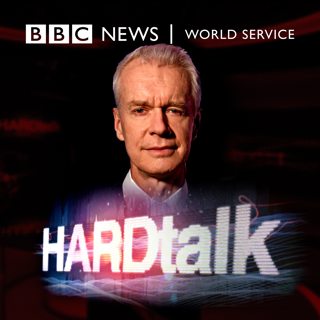
Krišjānis Kariņš: Is Latvia still vulnerable?
Stephen Sackur is in Riga to speak to the Prime Minister of Latvia, Krišjānis Kariņš. Latvia is now an established member of the EU and NATO, but Putin’s Ukraine invasion has revived fears of Russian expansionism. Three decades on from the collapse of the Soviet Union, is Latvia still vulnerable?
18 Aug 202222min

George Monbiot: Surrounded by fear
Humans face a series of interlinked existential challenges. How do we feed a global population heading towards ten billion? Can it be done without degrading ecosystems and exacerbating climate change to a calamitous extent? Stephen Sackur interviews writer and environmental activist George Monbiot, who has spent decades addressing these questions and framing radical answers. Why are so many politicians and voters seemingly unwilling to listen?
17 Aug 202223min

Shon Faye: The transgender issue
According to research in the US and the UK, roughly one in 100 may be transgender. But the fact that the debate about transgender rights has become a political battleground isn’t driven so much by the numbers but more by conflicting ideologies. Stephen Sackur asks author and journalist Shon Faye if all the attention on issues of sex, gender and identity is making it easier to be trans or not.This programme is subject to clarifications. In the interview with the transgender activist and writer Shon Faye, the presenter said: “There's quite a lot of data now on this, self-harm is a problem for people who are in this situation and suicide is also more common among trans young people than among the rest of the population”. In fact, the overall position is unclear as there is limited data on suicides among young trans people.On the point made by Shon Faye that puberty blockers are reversible, the NHS says little is known about their long term side effects in children with gender dysphoria, and that although the Gender and Identity Service (GIDS) advises this is a physically reversible treatment if stopped, it is not known what the psychological effects may be.Details here: https://www.bbc.co.uk/helpandfeedback/corrections_clarifications/
15 Aug 202223min

Amrullah Saleh: Is resistance in Afghanistan viable?
Stephen Sackur speaks to the former First Vice President of Afghanistan Amrullah Saleh, now a leader of the resistance dedicated to overthrowing the Taliban. A year after the Islamists returned to power, Afghanistan is in the grip of repression and starvation. Is resistance a viable option?
12 Aug 202224min

Albert Woodfox: Freedom after a life inside
There are some human experiences which most of us find it very hard to get our heads around. In 2019, Stephen Sackur spoke to Albert Woodfox, who experienced the unimaginable torment of more than four decades in solitary confinement, in a tiny cell in one of America’s most notorious prisons. He was the victim of ingrained racism and brutality inside America’s system of criminal justice. He was released from prison in 2016 and reflected on the meaning of freedom after everything he’d been through.This is another chance to listen to the interview with Albert Woodfox after his recent death.(Photo: Albert Woodfox, a former member of the Black Panthers, who was put in solitary confinement at the Louisiana State Penitentiary. Credit: Alain Jocard/AFP/Getty Images)
10 Aug 202223min

Gregory Doran: Why does Shakespeare still captivate us?
Stephen Sackur is in Stratford-upon-Avon, interviewing Gregory Doran, artistic director emeritus of the Royal Shakespeare Company. More than 400 years after his death, Shakespeare’s words and stories live on, transcending languages and borders. Why do we continue to make much ado about Shakespeare?
5 Aug 202223min

The Singh Twins: Mixing art and politics
Zeinab Badawi is at the Firstsite gallery in Colchester to speak to acclaimed contemporary British artists the Singh Twins. Their work combines Eastern and Western traditions with sharp political comment. What inspires their artistic vision?
3 Aug 202223min

James Lovelock: The future of life on Earth
In an interview recorded in 2021, Stephen Sackur speaks to one of the past century's most influential environmentalists, James Lovelock. He introduced us to the Gaia hypothesis – the idea that our planet and all the life on it are part of one dynamic, self-regulating system. At the age of 101, Lovelock still had big thoughts about the future of life on Earth. Have we humans sown the seeds of our own destruction?Audio for this episode updated on Monday 1st August 2022.
1 Aug 202223min






















